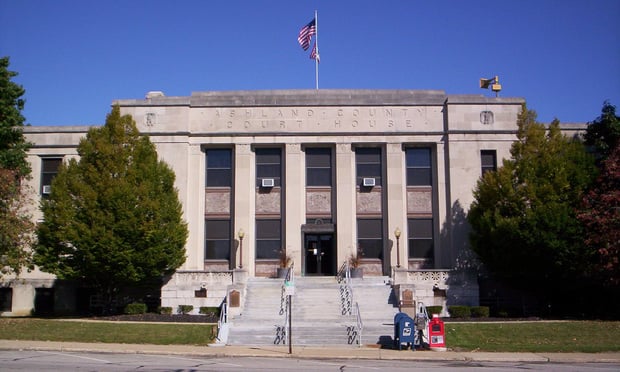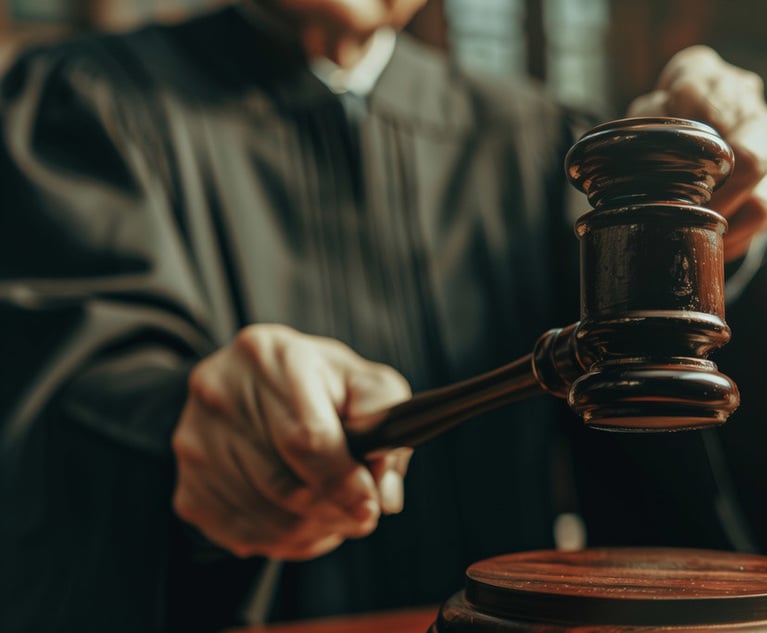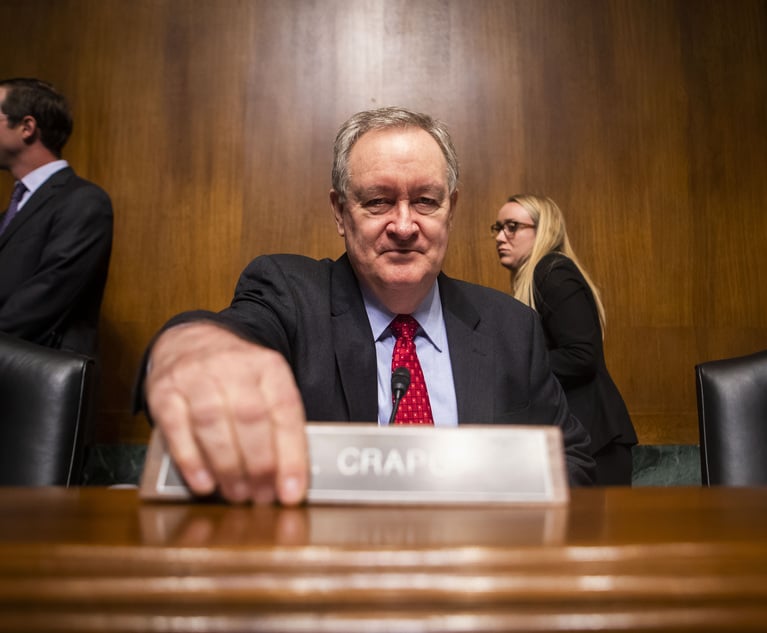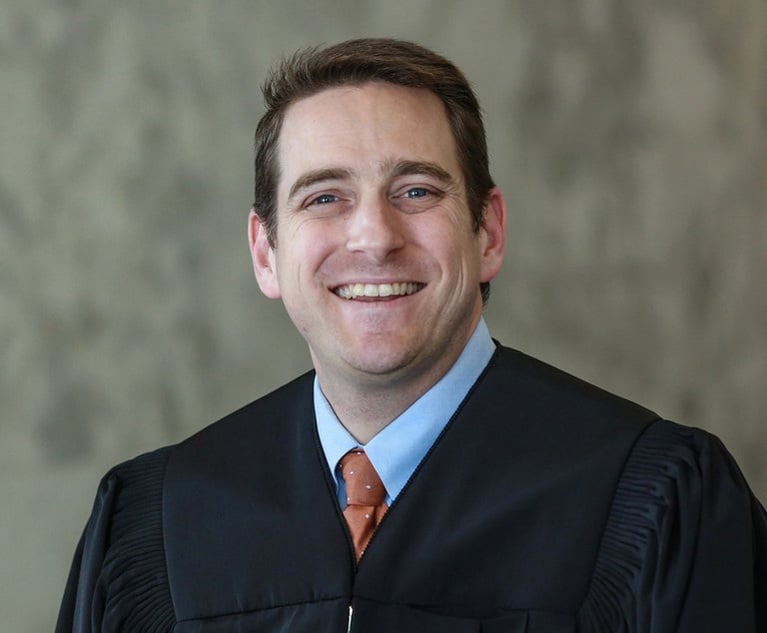No 'Hasty, Rushed Decisions': Ohio's First Post-COVID Trial Is Pushed Back to June
The trial judge said the state's highest court should not be forced to determine these issues on an emergency basis.
May 14, 2020 at 03:28 PM
6 minute read
 Ashland County Courthouse in Ohio. Photo: Courtesy Photo
Ashland County Courthouse in Ohio. Photo: Courtesy Photo
The case that had been set to become Ohio's first trial to be held in the midst of the COVID-19 pandemic has been pushed back more than a month, following an appeal to the state's Supreme Court and a decision by the common pleas judge as the trial date approached.
On Tuesday, Ashland County Court of Common Pleas Judge Ronald Forsthoefel granted a continuance in the case against Seth Whited. A new trial date has been set for June 29.
Whited had initially been ordered to face trial earlier in the month, in what was likely the first case to start during the pandemic. Those proceedings, however, were cut short when Whited had to be escorted out of the courthouse after suffering breathing problems and nearly collapsing. Although the incident was thought to be a panic attack, both Whited and his lawyer were quarantined following the episode, which was first reported by Law.com.
WATCH THE PROCEEDINGS: This video shows the first half of the proceedings that took place on April 28 in the Ashland County Court of Common Pleas in the first voir dire to occur following the COVID-19 outbreak.
The judge initially set to have the case move forward again on May 12. Forsthoefel's efforts to push the case forward garnered criticism from the defense bar, and eventually prompted Whited's attorney, Adam Charles Stone of Bucyrus, Ohio, to file a petition to the state Supreme Court, raising a host of constitutional issues that could come into play if attorneys are forced to wear masks and practice social distancing during trial.
On May 6, Forsthoefel issued an opinion holding that, although he believed the case could still go forward while practicing social distancing, he did not want the case to force the Ohio Supreme Court to have to make any "hastily drawn opinions or snap decisions" about constitutional questions unique to the COVID-19 health crisis.
"This court is not aware of any constitutional right under the Sixth and Fourteen Amendments to the United States Constitution and/or Article I, Section 10 of the Ohio Constitution to whisper into a client's ear, or that attorney-client communication can't be effectively completed with a pencil and a ruled legal pad, an accommodation for the use of silenced cellphones to communicate by text message, or to simply request a brief recess to confer verbally in a separate room outside the presence of the jury and other trial participants," he said. "This court is not convinced that the requirement of the use of face masks, unless standing or seated in a stationary position, adversely impacts defense counsel's ability to meaningfully cross-examine witnesses or present witnesses."
WATCH THE PROCEEDINGS: This video shows the second part of the proceedings in the voir dire in the trial against Seth Whited. The defendant can be seen exhibiting signs of a panic attack around the 2 hours and 25 minute mark.
However, the trial judge said the state's highest court should not be forced to determine these issues on an emergency basis.
"Hasty, rushed decisions can lead to unintended, negative consequences, and perhaps lead to a determination of rights that after additional thought and reflection would become regrettable later," he said. "This court certainly doesn't wish to put the justices in such a position with so little time to deliberate."
On Tuesday, the judge issued an order saying jury selection should begin June 29.
Forsthoefel's decision came two days after Stone filed a complaint to the state Supreme Court, which argued that the prior trial attempt had been "bereft of constitutional protections[.]" The filing noted that, in an effort to comply with social distancing procedures, the judge had ordered everyone to wear masks, and that the gallery be used for the jury. Although the proceedings were livestreamed, the move barred the public from the courtroom.
The changes, Stone argued, made it difficult for him to communicate with his client, and made it impossible in some instances to perform cross-examination. He further argued that the need to wear masks hid the jurors faces, making voir dire difficult, and increased jurors' anxiety, making it hard for them to focus on the case.
He also said that, in the weeks before the trial, the state's stay-at-home orders made it difficult for him to interview potential witnesses and he had been unable meet with Whited in person before the trial. Further, Stone argued, the proceedings violated the confrontation clause, since the defendant would not be able to be face-to-face with his accuser, and went against the right to a public trial.
The petition asked not only that Forsthoefel be ordered to stay Whited's case, but also that the justices establish constitutionally sound procedures that courts across Ohio could follow.
" This action involves the need for this honorable court to promulgate uniform trial procedures during the current COVID-19 pandemic that will protect the constitutional rights of defendants, while also protecting their safety and the safety of their attorneys, jurors, court staff and personnel[,]" the petition said.
In a response to the high court, Forsthoefel argued that the issue was moot, since he agreed to postpone the trial another month. Regarding the constitutional arguments, he said those boiled down to ineffective assistance of counsel claims, which were premature.
" These are matters that appellate courts routinely review in direct appeals from criminal convictions," he said. "For [Stone] to raise these claims at this stage is mere speculation; while there may have been practical difficulties experienced during the jury selection process on April 28, there is no guarantee that these same problems will occur when the case is ultimately tried, or that [Stone] will be able to demonstrate prejudice if they do occur."
On May 11, the high court dismissed the petition, saying that, since the trial wasn't imminent, Stone's claims were not ripe for review.
Although Whited's case was set to become the first trial to commence in the wake of the COVID-19 outbreak, another case is likely to win that distinction, as several cases are now set to potentially begin trial in Ashland County on June 2, a court official said. Also, according to its website, the Darke County Court of Common Pleas, which is on Ohio's border with Indiana, is set to begin a trial on May 15.
Stone did not return a call seeking comment, and a court representative said Forsthoefel was declining to speak about the pending Whited case.
This content has been archived. It is available through our partners, LexisNexis® and Bloomberg Law.
To view this content, please continue to their sites.
Not a Lexis Subscriber?
Subscribe Now
Not a Bloomberg Law Subscriber?
Subscribe Now
NOT FOR REPRINT
© 2025 ALM Global, LLC, All Rights Reserved. Request academic re-use from www.copyright.com. All other uses, submit a request to [email protected]. For more information visit Asset & Logo Licensing.
You Might Like
View All
Who Are the Judges Assigned to Challenges to Trump’s Birthright Citizenship Order?

Senator Plans to Reintroduce Bill to Split 9th Circuit

California's Chief Justice Starts Third Year With Questions About Fires, Trump and AI
4 minute readTrending Stories
- 1No Two Wildfires Alike: Lawyers Take Different Legal Strategies in California
- 2Poop-Themed Dog Toy OK as Parody, but Still Tarnished Jack Daniel’s Brand, Court Says
- 3Meet the New President of NY's Association of Trial Court Jurists
- 4Lawyers' Phones Are Ringing: What Should Employers Do If ICE Raids Their Business?
- 5Freshfields Hires Ex-SEC Corporate Finance Director in Silicon Valley
Who Got The Work
J. Brugh Lower of Gibbons has entered an appearance for industrial equipment supplier Devco Corporation in a pending trademark infringement lawsuit. The suit, accusing the defendant of selling knock-off Graco products, was filed Dec. 18 in New Jersey District Court by Rivkin Radler on behalf of Graco Inc. and Graco Minnesota. The case, assigned to U.S. District Judge Zahid N. Quraishi, is 3:24-cv-11294, Graco Inc. et al v. Devco Corporation.
Who Got The Work
Rebecca Maller-Stein and Kent A. Yalowitz of Arnold & Porter Kaye Scholer have entered their appearances for Hanaco Venture Capital and its executives, Lior Prosor and David Frankel, in a pending securities lawsuit. The action, filed on Dec. 24 in New York Southern District Court by Zell, Aron & Co. on behalf of Goldeneye Advisors, accuses the defendants of negligently and fraudulently managing the plaintiff's $1 million investment. The case, assigned to U.S. District Judge Vernon S. Broderick, is 1:24-cv-09918, Goldeneye Advisors, LLC v. Hanaco Venture Capital, Ltd. et al.
Who Got The Work
Attorneys from A&O Shearman has stepped in as defense counsel for Toronto-Dominion Bank and other defendants in a pending securities class action. The suit, filed Dec. 11 in New York Southern District Court by Bleichmar Fonti & Auld, accuses the defendants of concealing the bank's 'pervasive' deficiencies in regards to its compliance with the Bank Secrecy Act and the quality of its anti-money laundering controls. The case, assigned to U.S. District Judge Arun Subramanian, is 1:24-cv-09445, Gonzalez v. The Toronto-Dominion Bank et al.
Who Got The Work
Crown Castle International, a Pennsylvania company providing shared communications infrastructure, has turned to Luke D. Wolf of Gordon Rees Scully Mansukhani to fend off a pending breach-of-contract lawsuit. The court action, filed Nov. 25 in Michigan Eastern District Court by Hooper Hathaway PC on behalf of The Town Residences LLC, accuses Crown Castle of failing to transfer approximately $30,000 in utility payments from T-Mobile in breach of a roof-top lease and assignment agreement. The case, assigned to U.S. District Judge Susan K. Declercq, is 2:24-cv-13131, The Town Residences LLC v. T-Mobile US, Inc. et al.
Who Got The Work
Wilfred P. Coronato and Daniel M. Schwartz of McCarter & English have stepped in as defense counsel to Electrolux Home Products Inc. in a pending product liability lawsuit. The court action, filed Nov. 26 in New York Eastern District Court by Poulos Lopiccolo PC and Nagel Rice LLP on behalf of David Stern, alleges that the defendant's refrigerators’ drawers and shelving repeatedly break and fall apart within months after purchase. The case, assigned to U.S. District Judge Joan M. Azrack, is 2:24-cv-08204, Stern v. Electrolux Home Products, Inc.
Featured Firms
Law Offices of Gary Martin Hays & Associates, P.C.
(470) 294-1674
Law Offices of Mark E. Salomone
(857) 444-6468
Smith & Hassler
(713) 739-1250









